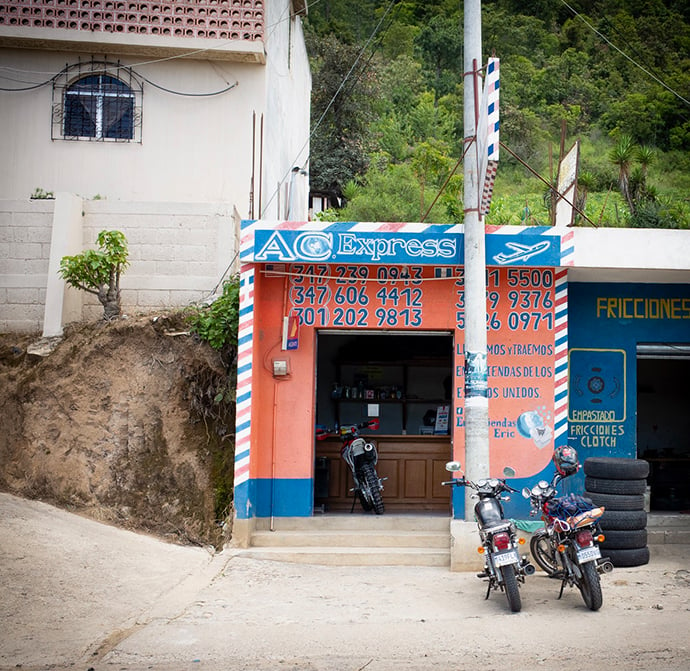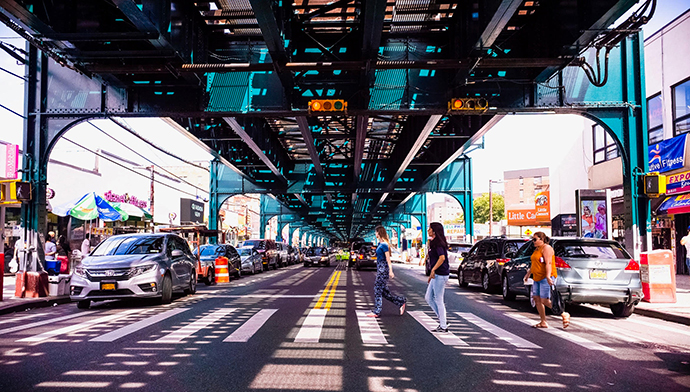One evening this spring, a young woman stood over the fire in her tiny, tin-walled home, stirring guisado, a traditional Mayan stew, in a heavy clay pot. Her two young children played with dolls at her feet, chatting in Kaqchikel, the local indigenous language. Her clothing—a bright blue blouse and a wraparound textile skirt, both of which she’d woven herself—was heavy, and she wiped sweat from her forehead with her left hand as she stirred the pot with her right. As the chicken simmered in tomatoes, cinnamon, and garlic, the air filled with a thick, savory smell.
Every few weeks, the woman, Maribel, cooks this same stew for her younger sister Fabiola, who joined the exodus of migrants from Guatemala three years ago, when she left their village of Las Canoas. Driven both by economic desperation and a fear of violence, Fabiola paid a smuggler to bring her to New York City, where she now works as a line cook at a Mexican restaurant in Jackson Heights, Queens.
The traditional narrative around migration focuses on forward momentum: people leave one place and land in another, where they concoct new lives from scratch. But for the families of Las Canoas, a remote hilltop town, the process feels less like creation and more like erasure. Locals say that in the past decade more than half of the town’s citizens have hired smugglers to take them to the United States, leaving behind spouses, children, parents, and friends. On both sides of the border, Guatemalans struggle to repair the seam torn wide by departure.
To cope with this distance, families like Maribel’s have turned to a service called Encomiendas Eric (Eric’s Parcels), an import-export business that shuttles goods between migrants and their families. Twice a month, Encomiendas Eric, which operates out of a dusty storefront on the town’s single road, flies an employee to Dulles Airport in Northern Virginia. There, she rents a car and drives up to Boston, hand-delivering packages to Guatemalans surviving thousands of miles from everything and everyone they’ve ever known.

Encomiendas Eric’s office in Las Canoas, Guatemala. All photos by Emily Kaplan.
Migration to the United States began to rise during Guatemala’s Civil War, which lasted from 1960 to 1996; it surged in the late 1990s, as the country grappled with a precarious labor market and high rates of violence. Around that time, Eric Estacuy realized that his neighbors’ exodus presented a business opportunity. “We offer a way to narrow the distance between families,” he said. He started with one office, in the province of Quiché, and a courier made the trip intermittently, depending on demand. Now, Encomiendas Eric has two offices and makes two trips a month.
Eric has the business down to a science: every other Monday, he puts out notice—on the business’s Facebook page, but also by word of mouth—that the regional offices will be accepting packages. The next day, a driver picks up the packages, packs them into cooler bags in three suitcases, and brings them to the airport in Guatemala City. Once the driver lands in Virginia, she spends the next forty-eight hours driving up and down the congested highways of the Northeast Corridor.
The service doesn’t come cheap: to ship food, Eric charges $8 to $10 per pound; to ship other items—such as legal documents, clothing, and children’s drawings—prices vary. For medication, which undocumented immigrants often have trouble obtaining in the United States, Eric charges one dollar a pill.
Despite the cost, Fabiola and her family are loyal customers. Fabiola estimates that Encomiendas Eric’s driver arrives at her doorstep about ten times a year. In the past three years, Fabiola’s family has sent her a wide variety of items: not just guisado and tamales, but also her birth certificate, medicine, and indigenous attire handwoven by her mother. “It’s a way to feel close to my family, to not forget our traditions,” Fabiola said.
The business operates in the other direction too. Fabiola has used Encomiendas Eric to send all sorts of things back to her family in Las Canoas: clothing, shoes, technology, and toys for her small nephews. “The children have so many dreams of having things that you can’t get in Guatemala,” she said. “And it’s a way to make it real to them what it’s really like to live here.”
Fabiola doesn’t intend to stay in the United States forever; for her, the distance, and the sense of loss, are too great. “Things don’t have the same taste here,” she said. Once she has saved enough money, she intends to return to Las Canoas and open a restaurant.
For now, though, Fabiola has only her sister’s guisado.

Near Fabiola’s apartment in Queens, New York.
It was a sunny Saturday morning in Queens, and Fabiola was chatting with Maribel on WhatsApp as her ten-year-old son played video games on the couch. Their roommates—Fabiola’s cousins—sat on the other couch, watching soccer on TV. The crowded, linoleum-floored apartment is typical of the area: it occupies the fifth floor of a narrow building, above an Armenian bakery. Outside the apartment, a man in a turban sold falafel; next to him, another man, who seemed to speak only Spanish, sold smoothies from a cart.
Then Fabiola’s phone rang: the guisado would be there in five minutes. Fabiola rushed out the door and took the elevator to the street, where she met the Encomiendas Eric driver, a sprightly, freckled young woman, on the corner. She thanked her and handed her $20. The driver briskly returned to her car and started the engine. She had many more deliveries to make that day, and the sun was beginning to set.
As her son did homework at the kitchen table, Fabiola took the frozen stew out of its container. It was an unseasonably hot day, and Fabiola, still wearing her work uniform, was sweating through her polo. She flipped on the stove’s fluorescent light, then switched on a burner. She placed the guisado into a pot, then stood back. Quickly, Fabiola’s kitchen filled with the rich aroma of home.


